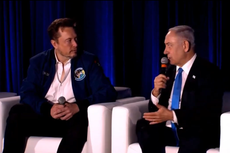Protesters condemn Iran prisoner swap as Raisi speaks to United Nations in New York
Ebrahim Raisi and Joe Biden both spoke at the General Assembly on Tuesday
Protesters chanted slogans in New York outside the United Nations General Assembly on Tuesday as both US President Joe Biden and Iran’s President Ebrahim Raisi were set to address the gathering of world leaders.
While demonstrations against Iran and calls for the arrest of its leaders for violations of human rights law are not uncommon around the UN meetings in New York, the US government has long held the position that the visiting heads of various authoritarian regimes should be allowed to address the UN without fear of arrest by US law enforcement.
The address of Mr Raisi on Tuesday comes, however, the day that seven Americans returned home from custody in Iran after being held for years on various charges that the US government have long said were false and politically-motivated. That agreement, struck between the Biden administration and Mr Raisi’s government, appears to have been unpopular with hardline conservatives in both nations.
In the US, Mr Biden’s deal to free US civilians held in Iran’s prisons was criticised by Donald Trump and right-wing conservatives in the Republican Party, despite the United States having a long tradition of working to secure the release of detained US citizens in such arrangements. Administration officials and supporters of the most recent prisoner swap noted that the $6bn in funds to be released to Iran are to be strictly monitored and used only for humanitarian purposes.
The US government also didn’t fund the deal; the money released to Iran came from oil revenue frozen by banks.
But some opponents of the deal have argued that the money is a much-needed bandage for a reeling authoritarian government that has faced new questions of legitimacy after months of protests in response to the murder of a young woman by the country’s so-called “morality police”. The one-year anniversary of the murder of the young woman, Mahsa Amini, passed earlier this month.
The Organization of Iranian American Communities, which organised the anti-Raisi protest in New York on Tuesday, provided a statement to The Independent condemning the release of funds to Iran.
“Releaseing $6bn as ransom to the world’s leading state-sponsor of terrorism is a shameful act that cannot be justified under any pretexts,” said Dr Ramesh Sepehrrad, chair of the OIAC advisory council.
“This will only embolden the regime and lead to more hostage-taking and terrorism,” she insisted.
Prisoner swaps and other arrangements to secure the release of US citizens held abroad have become an increasingly politically charged issue in recent years.
The release of WNBA star Brittany Griner by Russia’s government in exchange for the release of an arms dealer by the US was also condemned by many conservatives. Ms Griner, who played basketball abroad as well in the US, was barred from returning after a small amount of THC was found in her baggage. She was sentenced to nine years in prison by a Russian court in 2022 before the US government intervened.
Complicating the issue: high-profile imprisonments of Americans on charges that the US government argue are trumped up are seemingly increasing. A debate is now underway regarding whether the US’s policy of asceding to demands of regimes where US citizens are held on politically motivated charges is encouraging such acts to be carried out more often.
The president-elect of the National Council of Resistance of Iran, Maryam Rajavi, said in a statement that the UN’s member-states should accept the view that Iran’s government is illegitimate, and recognise the right of protesters within the country to topple it.
“They must prosecute Khamenei and Raisi in an international court and for genocide and crimes against humanity,” she added. “They must place the clerical regime under Chapter VII of the UN Charter as a threat to world peace and security.”
Join our commenting forum
Join thought-provoking conversations, follow other Independent readers and see their replies
Comments





Bookmark popover
Removed from bookmarks